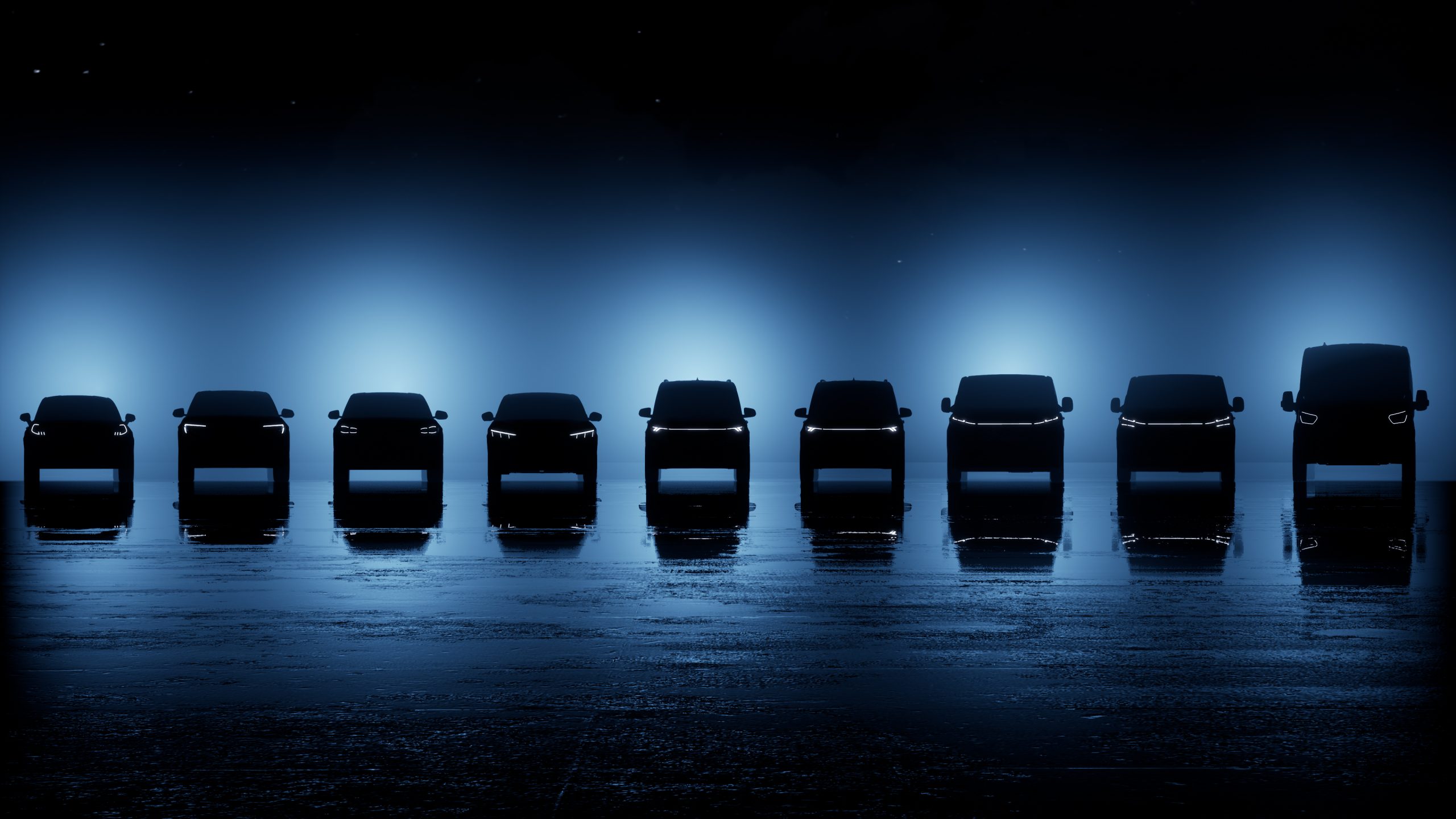
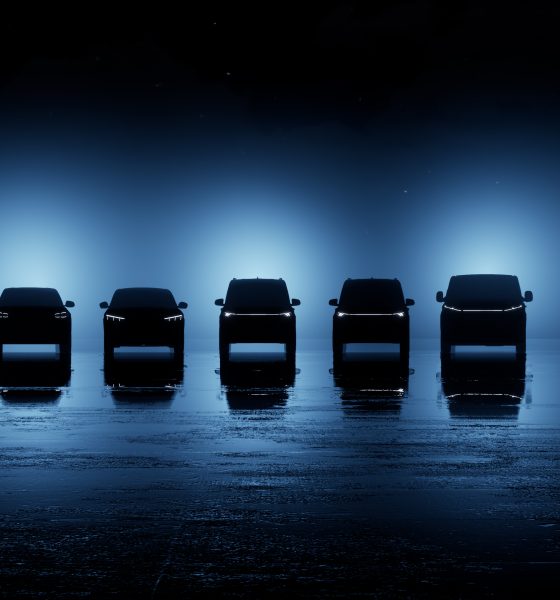
News
Ford Model e unit announces massive expansion of EV initiative in Europe: 7 new EVs by 2024
Ford’s electric vehicle unit — known as Model e — announced today that it would take massive steps to expand its electric vehicle project in Europe. Ford, which recently split its electric vehicle and combustion engine businesses into two divisions, is aiming to roll out seven new electric vehicles in Europe by 2024 with an annual production capacity of 600,000 vehicles by 2026.
Ford announced the expansion plan today, recognizing the accelerating pace of electrification in the European market. “I am delighted to see the pace of change in Europe – challenging our entire industry to build better, cleaner, and more digital vehicles. Ford is all-in and moving fast to meet the demand in Europe and around the globe,” Ford CEO Jim Farley said in a statement. “This is why we have created Ford Model e – allowing us to move at the speed of a start-up to build electric vehicles that delight and offer connected services unique to Ford and that are built with Ford-grade engineering and safety.”
Ford’s Model e division aims to take advantage of a Tesla-like business model that completely separates the electric vehicle projects from the traditional combustion engine powertrains that Ford built its legacy on. As one of the most-committed legacy automakers in the transition to electrification, Ford recently announced it would commit to a production goal of 600,000 EVs by the end of 2023.
In Europe, electric vehicles have become extremely popular, becoming a more common choice of consumers than combustion engine vehicles in some regions. Ford is turning some focus toward this market as it is likely to be one of the biggest catalysts to EV sales company-wide. Ford said it expects annual sales in Europe to exceed 600,000 units in 2026, reaffirming its intention to deliver a 6 percent EBIT margin in Europe in 2023.
“Our march toward an all-electric future is an absolute necessity for Ford to meet the mobility needs of customers across a transforming Europe,” Ford of Europe Chairman Stuart Rowley said. “It’s also about the pressing need for greater care of our planet, making a positive contribution to society and reducing emissions in line with the Paris Climate Agreement.”
Seven New EVs by 2024
With the Mustang Mach-E already having a successful introduction into the European market, Ford will also welcome the E-Transit to the region in Q2 2022. By 2024, Ford plans to introduce seven additional models to its electric lineup in Europe. It will include three new passenger vehicles and four new commercial cars.
In 2023, Ford will begin production of an all-new passenger EV. The company says it will be a “medium-sized crossover, built in Cologne with a second electric vehicle added to the Cologne production line-up in 2024.” Ford will also introduce an electric version of the Ford Puma. It will be produced in Craiova, Romania, starting in 2024.
Ford, which recently split its electric vehicle and combustion engine businesses into two divisions, is aiming to roll out seven new electric vehicles in Europe by 2026 with an annual production capacity of 600,000 vehicles. (Credit: Ford)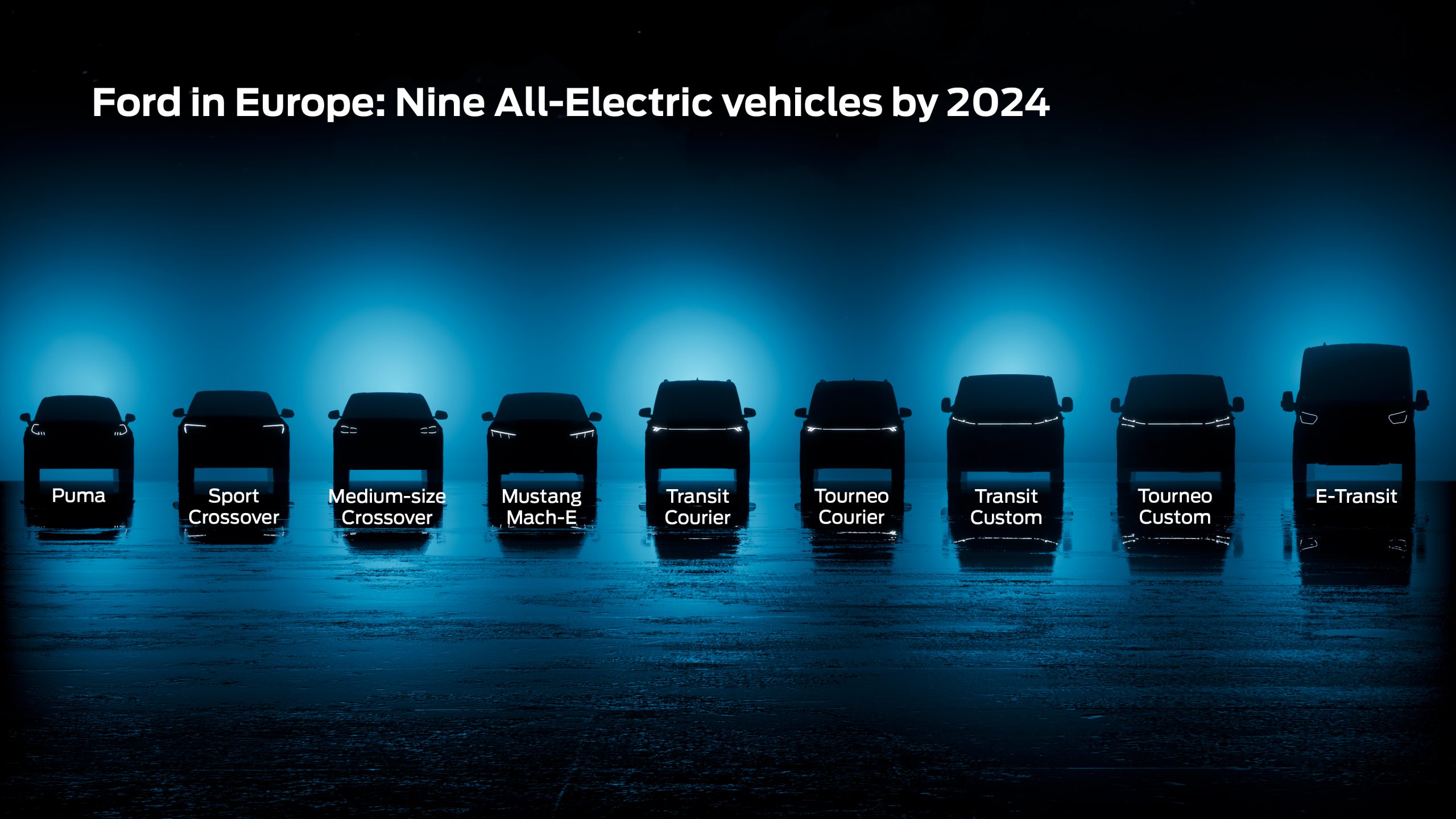
Ford is Europe’s top-selling commercial vehicle brand, and the company plans to introduce several new electric models of its Transit van — “the all-new Transit Custom one-tonne van and Tourneo Custom multi-purpose vehicle in 2023, and the smaller, next-generation Transit Courier van and Tourneo Courier multi-purpose vehicle in 2024.”
“These new Ford electric vehicles signal what is nothing less than the total transformation of our brand in Europe – a new generation of zero-emission vehicles, optimized for a connected world, offering our customers truly outstanding user experiences,” Rowley added.
Ford’s Cologne, Germany EV Hotspot
Ford also said that the first all-electric passenger vehicle to come out of the new Electrification Centre in Cologne will be a five-seat, medium-sized crossover. Crossovers are a widely popular body style and accounted for 58 percent of all Ford passenger vehicles sold in Europe in 2021. Ford plans to unveil the name and design of the new crossover in 2022. Production will begin in 2023.
Ford’s Cologne Electrification Center (Credit: Ford)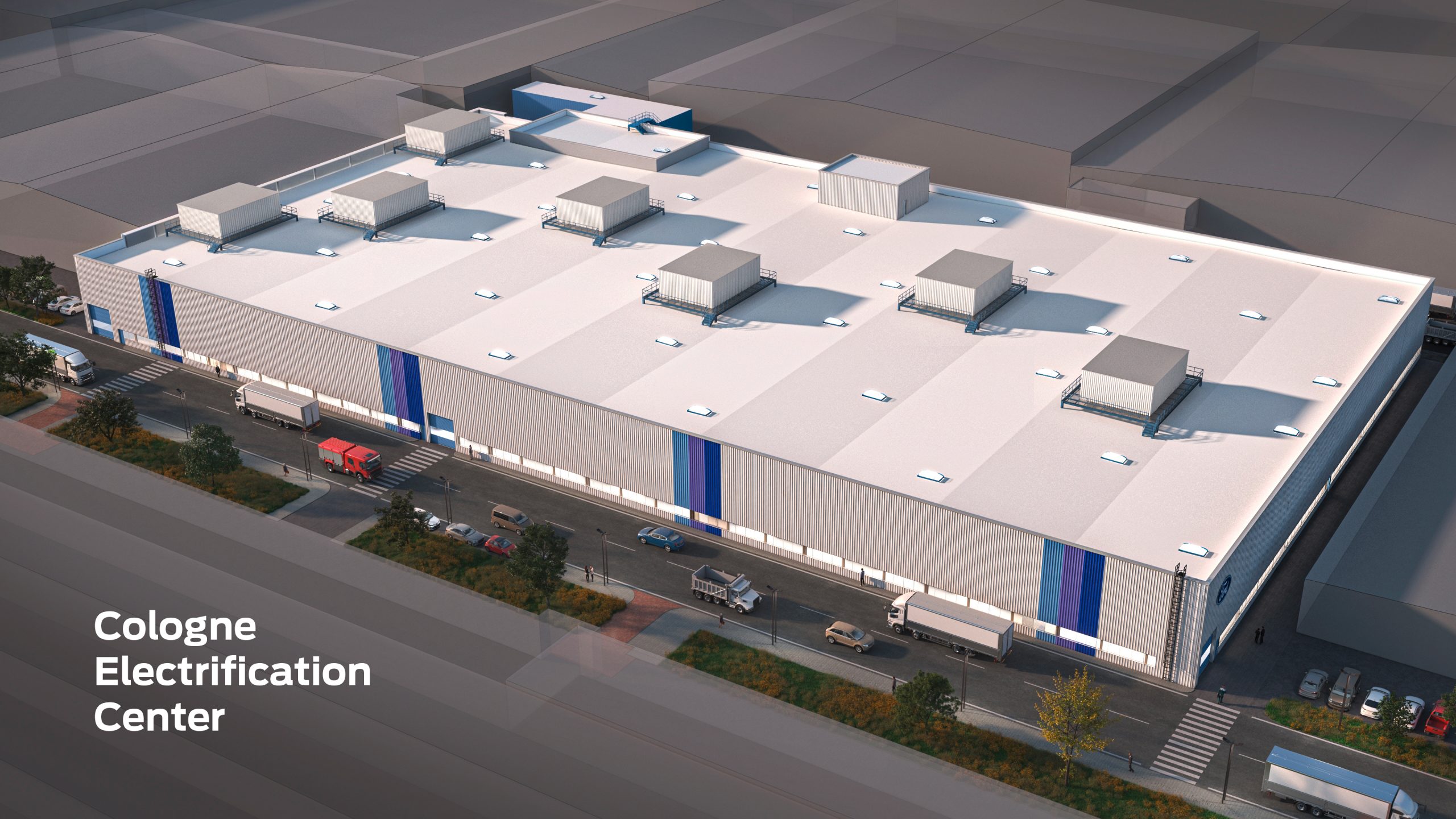
Additionally, Ford said its total investment in Cologne is expected to be $2 billion with the investment including plans for a new battery assembly facility that will begin production in 2024. The automaker projects at least 1.2 million vehicles produced at the Cologne Electrification Centre by 2030.
New battery partnership with SK On Co., Ltd., and Koç Holding
Ford announced that it also signed a non-binding Memorandum of Understanding for a new, industry-leading joint venture in Turkey with battery manufacturers SK On Co., Ltd. and Koç Holding. The plant will be located near Ankara, the country’s capital, and will manufacture high-Nickel Nickel-Manganese-Cobalt (NMC) cells for assembly into battery array modules. Nickel cells have been a focus of many large automakers transitioning to electric cars, as it is widely available. However, surging prices of the metal have contributed to a potential delay in these plans, at least in the short term.
Production is expected to start as early as mid-decade, Ford said, with annual capacity likely to be between 30 and 45 Gigawatt hours.
Ford said the investment will also be supported by the Turkish Government and will benefit large and small commercial vehicle operators across Europe, all while decreasing CO2 emissions.
EV Production Boost in Romania
Ford will also introduce an electric version of its best-selling European vehicle, the Puma. European customers will be able to purchase an all-electric version of the vehicle in 2024. Additionally, the Transit Courier and Tourneo Courio will be produced a the plant in 2023, with all-electric versions being offered the following year.
Ford’s joint venture with Koç Holding, known as Ford Otosan, will assume ownership of the Craiova, Romania plant. “We welcome this opportunity to grow our joint venture with Koc Holding and leverage this strategic partnership to better utilize our resources and know-how in Romania,” Rowley said. “Ford Craiova is today a strong success story, and we believe that through Ford Otosan’s experience and expertise in electrification and commercial vehicles it can reach even higher levels of achievement.”
I’d love to hear from you! If you have any comments, concerns, or questions, please email me at joey@teslarati.com. You can also reach me on Twitter @KlenderJoey, or if you have news tips, you can email us at tips@teslarati.com.

News
Tesla already has a complete Robotaxi model, and it doesn’t depend on passenger count
That scenario was discussed during the company’s Q4 and FY 2025 earnings call, when executives explained why the majority of Robotaxi rides will only involve one or two people.

Tesla already has the pieces in place for a full Robotaxi service that works regardless of passenger count, even if the backbone of the program is a small autonomous two-seater.
That scenario was discussed during the company’s Q4 and FY 2025 earnings call, when executives explained why the majority of Robotaxi rides will only involve one or two people.
Two-seat Cybercabs make perfect sense
During the Q&A portion of the call, Tesla Vice President of Vehicle Engineering Lars Moravy pointed out that more than 90% of vehicle miles traveled today involve two or fewer passengers. This, the executive noted, directly informed the design of the Cybercab.
“Autonomy and Cybercab are going to change the global market size and mix quite significantly. I think that’s quite obvious. General transportation is going to be better served by autonomy as it will be safer and cheaper. Over 90% of vehicle miles traveled are with two or fewer passengers now. This is why we designed Cybercab that way,” Moravy said.
Elon Musk expanded on the point, emphasizing that there is no fallback for Tesla’s bet on the Cybercab’s autonomous design. He reiterated that the autonomous two seater’s production is expected to start in April and noted that, over time, Tesla expects to produce far more Cybercabs than all of its other vehicles combined.
“Just to add to what Lars said there. The point that Lars made, which is that 90% of miles driven are with one or two passengers or one or two occupants, essentially, is a very important one… So this is clearly, there’s no fallback mechanism here. It’s like this car either drives itself or it does not drive… We would expect over time to make far more CyberCabs than all of our other vehicles combined. Given that 90% of distance driven or distance being distance traveled exactly, no longer driving, is one or two people,” Musk said.
Tesla’s robotaxi lineup is already here
The more interesting takeaway from the Q4 and FY 2025 earnings call is the fact that Tesla does not need the Cybercab to serve every possible passenger scenario, simply because the company already has a functional Robotaxi model that scales by vehicle type.
The Cybercab will handle the bulk of the Robotaxi network’s trips, but for groups that need three or four seats, the Model Y fills that role. For higher-end or larger-family use cases, the extended-wheelbase Model Y L could cover five or six occupants, provided that Elon Musk greenlights the vehicle for North America. And for even larger groups or commercial transport, Tesla has already unveiled the Robovan, which could seat over ten people.
Rather than forcing one vehicle to satisfy every use case, Tesla’s approach mirrors how transportation works today. Different vehicles will be used for different needs, while unifying everything under a single autonomous software and fleet platform.
News
Tesla Cybercab spotted with interesting charging solution, stimulating discussion
The port is located in the rear of the vehicle and features a manual door and latch for plug-in, and the video shows an employee connecting to a Tesla Supercharger.
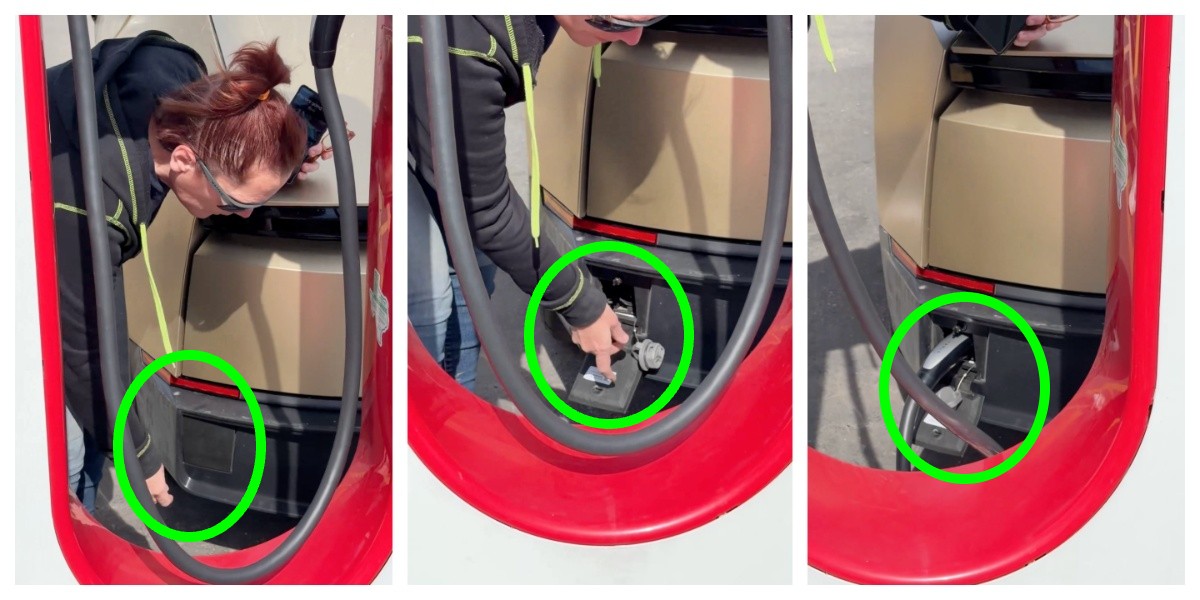
Tesla Cybercab units are being tested publicly on roads throughout various areas of the United States, and a recent sighting of the vehicle’s charging port has certainly stimulated some discussions throughout the community.
The Cybercab is geared toward being a fully-autonomous vehicle, void of a steering wheel or pedals, only operating with the use of the Full Self-Driving suite. Everything from the driving itself to the charging to the cleaning is intended to be operated autonomously.
But a recent sighting of the vehicle has incited some speculation as to whether the vehicle might have some manual features, which would make sense, but let’s take a look:
🚨 Tesla Cybercab charging port is in the rear of the vehicle!
Here’s a great look at plugging it in!!
— TESLARATI (@Teslarati) January 29, 2026
The port is located in the rear of the vehicle and features a manual door and latch for plug-in, and the video shows an employee connecting to a Tesla Supercharger.
Now, it is important to remember these are prototype vehicles, and not the final product. Additionally, Tesla has said it plans to introduce wireless induction charging in the future, but it is not currently available, so these units need to have some ability to charge.
However, there are some arguments for a charging system like this, especially as the operation of the Cybercab begins after production starts, which is scheduled for April.
Wireless for Operation, Wired for Downtime
It seems ideal to use induction charging when the Cybercab is in operation. As it is for most Tesla owners taking roadtrips, Supercharging stops are only a few minutes long for the most part.
The Cybercab would benefit from more frequent Supercharging stops in between rides while it is operating a ride-sharing program.
Tesla wireless charging patent revealed ahead of Robotaxi unveiling event
However, when the vehicle rolls back to its hub for cleaning and maintenance, standard charging, where it is plugged into a charger of some kind, seems more ideal.
In the 45-minutes that the car is being cleaned and is having maintenance, it could be fully charged and ready for another full shift of rides, grabbing a few miles of range with induction charging when it’s out and about.
Induction Charging Challenges
Induction charging is still something that presents many challenges for companies that use it for anything, including things as trivial as charging cell phones.
While it is convenient, a lot of the charge is lost during heat transfer, which is something that is common with wireless charging solutions. Even in Teslas, the wireless charging mat present in its vehicles has been a common complaint among owners, so much so that the company recently included a feature to turn them off.
Production Timing and Potential Challenges
With Tesla planning to begin Cybercab production in April, the real challenge with the induction charging is whether the company can develop an effective wireless apparatus in that short time frame.
It has been in development for several years, but solving the issue with heat and energy loss is something that is not an easy task.
In the short-term, Tesla could utilize this port for normal Supercharging operation on the Cybercab. Eventually, it could be phased out as induction charging proves to be a more effective and convenient option.
News
Tesla confirms that it finally solved its 4680 battery’s dry cathode process
The suggests the company has finally resolved one of the most challenging aspects of its next-generation battery cells.
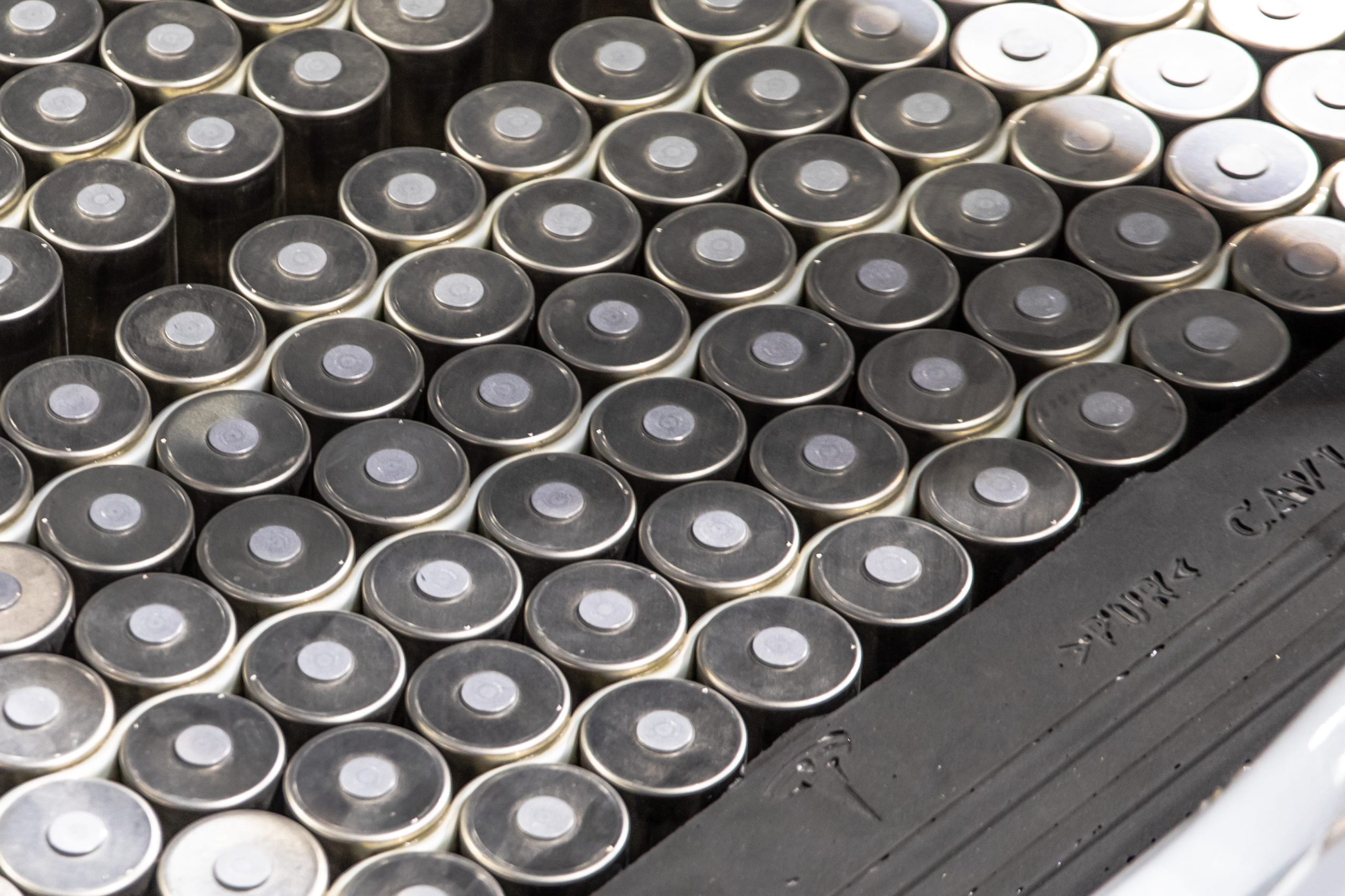
Tesla has confirmed that it is now producing both the anode and cathode of its 4680 battery cells using a dry-electrode process, marking a key breakthrough in a technology the company has been working to industrialize for years.
The update, disclosed in Tesla’s Q4 and FY 2025 update letter, suggests the company has finally resolved one of the most challenging aspects of its next-generation battery cells.
Dry cathode 4680 cells
In its Q4 and FY 2025 update letter, Tesla stated that it is now producing 4680 cells whose anode and cathode were produced during the dry electrode process. The confirmation addresses long-standing questions around whether Tesla could bring its dry cathode process into sustained production.
The disclosure was highlighted on X by Bonne Eggleston, Tesla’s Vice President of 4680 batteries, who wrote that “both electrodes use our dry process.”
Tesla first introduced the dry-electrode concept during its Battery Day presentation in 2020, pitching it as a way to simplify production, reduce factory footprint, lower costs, and improve energy density. While Tesla has been producing 4680 cells for some time, the company had previously relied on more conventional approaches for parts of the process, leading to questions about whether a full dry-electrode process could even be achieved.
4680 packs for Model Y
Tesla also revealed in its Q4 and FY 2025 Update Letter that it has begun producing battery packs for certain Model Y vehicles using its in-house 4680 cells. As per Tesla:
“We have begun to produce battery packs for certain Model Ys with our 4680 cells, unlocking an additional vector of supply to help navigate increasingly complex supply chain challenges caused by trade barriers and tariff risks.”
The timing is notable. With Tesla preparing to wind down Model S and Model X production, the Model Y and Model 3 are expected to account for an even larger share of the company’s vehicle output. Ensuring that the Model Y can be equipped with domestically produced 4680 battery packs gives Tesla greater flexibility to maintain production volumes in the United States, even as global battery supply chains face increasing complexity.








